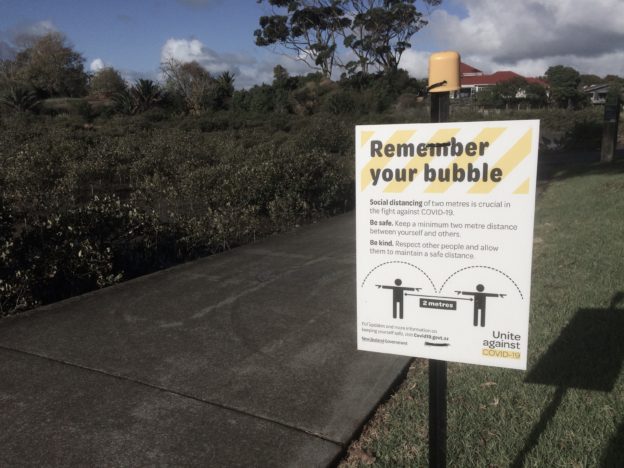In New Zealand there’s been lots of debate about moving down to Alert Level 2, but the government restricting social gatherings to a maximum of 10 people — including church services and weddings (funerals just got a boost to 50 people, but you have to sign a form and submit it to the Health Department). Friends are upset about the double-standards compared to cinemas and malls and bars, and there’s questions about how all this might be enforced (with new legislation allowing police to enter your house without a warrant to break up gatherings).
For what it’s worth, here are some thoughts:
- Friends, we don’t live in a Christian country. Sorry to burst your bubble. Our roots and origins are a complex mix of good and bad influences in Christ’s name, but all that’s a bygone era. (Even our glorified NZ anthem was written by a Deist, not a Christian). Like most other Western countries, the fallout from the Enlightenment means that “the candles in the churches are out” (as MacLeish puts it) and we’ve grown up in a secular, pluralistic age.
- So there’s not much point protesting that the government’s classed religious services as “social”, not “essential” – how else would they think? In a country with universal health, generous welfare system and lots of secular social support, I think we lost the essential tag in wider society years ago. But that’s OK, perhaps like the early Christians we can speak more courageously about the essential Jesus from the margins.
- We really have been given the gift of life, safety and security in New Zealand. I think sometimes that blinds us to the really difficult choices and trade-offs that our health officials and leaders have to make. Paul reminds us to pray for our leaders (1 Tim 2:1-3). Let’s match every protest we utter on Facebook with a heartfelt prayer that God grants wisdom to our leaders. Our earliest brothers and sisters could still do that while living under Roman occupation where they had far less civil rights than we do or don’t have.
- Yet I’m sad when Christians who want to gather safely in a country currently with less than 100 active COVID cases and no strong evidence for community transmission are being treated (by other Christians, no less!) like agitators, public enemies, conspiracy theorists. Sure, some might have unhelpful agendas. But many just don’t want to give up meeting together (Heb 10:28). Not churching together hurts too — hear them out.
- It’s not a fair comparison to use what’s happened in churches overseas to shame churches and leaders here in New Zealand who want to meet together. Those examples are of churches in pre-lockdown, uncontrolled virus situations. Even I was pretty wary about the wisdom of physically gathering on our final Sunday service before lockdown. Obviously there’s still unknowns and things could change quickly, but if we’re going back to work and restaurants are opening up, I think by God’s grace we’re in a better situation than before.
- I’m hearing lots of Christians who are defending not meeting together by emphasising that the church scattered is still church. On one had, I agree: this is an even more obvious reality in countries with severe persecution such as the Middle East and in parts of Asia. But I’ve had the privilege of meeting some of our persecuted brothers and sisters — and they really, really, really want to meet together again. For years, they’ve risked their lives to do so. Why? Because meeting together is essential.
- That’s why I find it puzzling that many of my friends are in no hurry to meet together physically (with safety precautions of course). And it’s odd when I hear Kiwi church leaders speak of resuming worship services as a nice to have (or even an annoyance – all the H&S requirements etc!). I wonder there if our consumerism is starting to take over? I mean, if all I’m looking for in church (familiar faces, an inspiring talk, some worship music) is adequately fulfilled in an hour-long broadcast I can enjoy in my pyjamas with the fast-forward button at the ready, how will we fare when church meetings become more costly and inconvenient again? When we need to get out of bed early, and give up our preferences for each other again? For all its difficulties and risks, every Lord’s day we can’t meet physically, we are missing out on fully proclaiming the Lord’s death till He comes. Let’s not forget that.
Someone asked me the other day – “Are you reading anything else in the Bible? It’d be a bit depressing just to be in Job!” Relax – I’m in the New Testament too! And this morning I was really struck by Philippians 1:27 (the original reason I felt like jotting some thoughts down), where Paul says:
“Only live as citizens as worthy of the gospel of Christ, so that whether I am coming and seeing you, or whether I am absent, I will hear the things concerning you: that you are standing firm in the Spirit, with one mind striving for the faith of the gospel, and not frightened by anything from those who oppose you.”
Philippians 1:27-28, own translation
The “live as citizens” bit in particular struck me this morning. Later in the letter Paul talks about how “our citizenship is in heaven” (3:20) – but here the specific phrase is to live as citizens worthy of the gospel of Christ. I want to attach that attitude to my speech, my conduct, my fear of those who oppose me. Why? Because the gospel of Christ is worth living for.
So for the time being (Alert Level 2), I take being a good Christian citizen in New Zealand to mean:
- Living worthy of the gospel of Christ, standing firmly in the Spirit, so that it’s obvious to others watching that Jesus is essential, not just social
- Praying for leaders, officials, workers who are making tough, life-saving decisions on my behalf
- Modelling a desire and longing to share my faith — including by worshipping together physically once we can do so safely
- Remembering that I have dual citizenship — here on earth, and there in the new heavens and earth, where our Saviour awaits us and will one day subject all things — COVID-19 included — to Himself (Phil 3:20-21).




